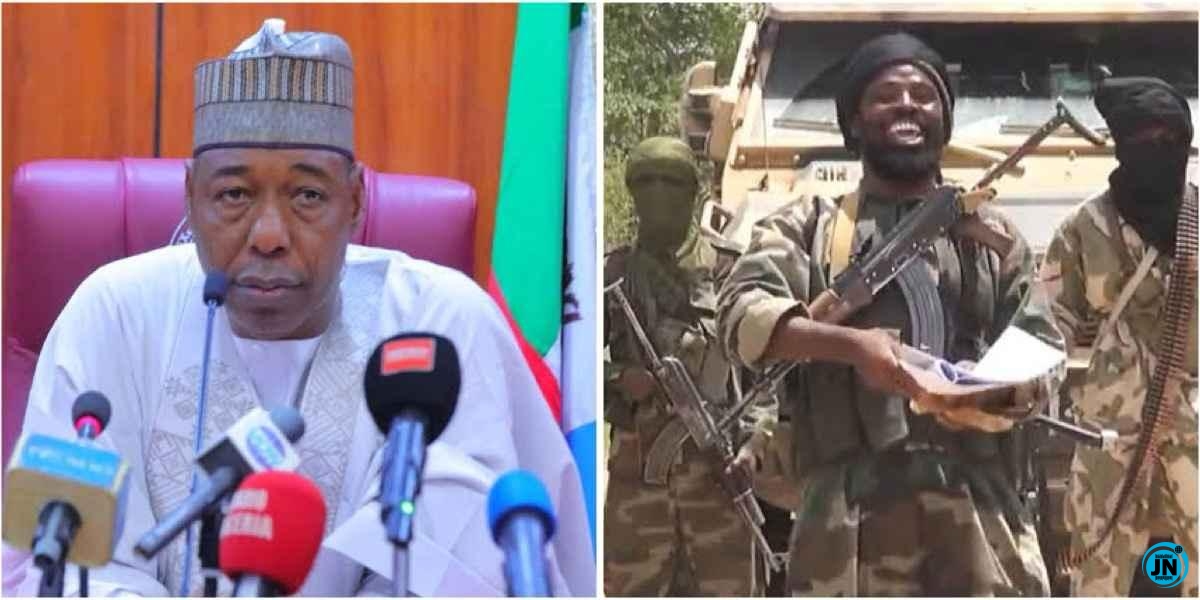
Borno State Governor, Babagana Zulum, has sounded a serious warning regarding the security situation in the region, revealing that Boko Haram has informants embedded among politicians and military personnel. This startling revelation was made during a detailed interview on Breakfast Central, broadcasted on News Central TV, where the governor expressed deep concern over internal sabotage undermining efforts to combat insurgency.
Governor Zulum stressed the urgent need for the government to act decisively against these internal collaborators, stating that the authorities would deal “ruthlessly” with anyone found aiding the insurgents in any capacity. His comments highlighted the complex nature of the security challenges faced, as he explained, “We have informants and collaborators within the Nigerian armed forces, within the politicians, and within the communities. What we shall do is to strengthen our intelligence and to deal with them ruthlessly.”
In the same interview, Zulum criticized the prevailing “contractocracy” system, which he believes has contributed to prolonging the crisis. He called for a significant change in the approach to tackling insecurity in the region. “Let’s remove contractocracy. In six months, we can put an end to this madness. We need not politicise insecurity,” he remarked, urging a unified and strategic approach to restoring peace.
Addressing the sensitive issue of Boko Haram fighters who have surrendered, Governor Zulum acknowledged that while not every surrendering insurgent may have genuinely renounced violence, the vast majority have disengaged from terrorist activities. “I cannot completely say that 100% of those people who have surrendered are doing the right thing, but I want to assure you that over 99% are doing well and are not participating in the ongoing terrorism,” he clarified, emphasizing the importance of rehabilitation and reintegration efforts.
Zulum also underscored the necessity of complementing military operations with social, political, and economic strategies. He warned that relying solely on military force would not bring an end to the insurgency. “Insurgency will never be ended by kinetic measures alone,” he said. “We must ensure that non-kinetic measures are also properly put in place.” He further explained, “What I mean by non-kinetic measures is social, political, and economic dimensions of the crisis. Our ongoing non-kinetic measures have yielded positive results with the support of the Nigerian military.”
The governor was candid about the challenges, admitting the possibility that among the over 500,000 individuals who have surrendered and repented, some may relapse and return to insurgency. “Yes, I believe among the 500,000 or more that have repented, I cannot rule out the possibility of fewer of them going back to the bush,” he said, highlighting the ongoing risk and the need for continuous monitoring and support.
Further complicating the fight against insurgency, Zulum raised concerns about the insurgents’ technological advantages and the Nigerian army’s inadequate equipment to effectively combat these threats. “The army doesn’t have the necessary equipment on ground to fight the insurgency,” he revealed, calling for urgent improvements in military resources.
Despite these obstacles, Governor Zulum took time to commend the Nigerian armed forces for their invaluable support to the state’s non-kinetic initiatives aimed at peacebuilding and rehabilitation. “I want to commend the Nigerian armed forces for the support that they have been rendering to our non-kinetic measures,” he acknowledged, underscoring the importance of collaboration between military and civilian efforts.
In conclusion, Zulum issued a strong appeal to President Bola Tinubu, urging him to rely on credible and professional military intelligence from the ground to effectively fight terrorism. “The forest guard shall be provided immediately,” he said firmly. “The President of Nigeria needs to listen to those who can differentiate their left from their right. We should not politicise insecurity. The President needs to listen to the people who can tell him the right thing. The President should listen to the army.”

